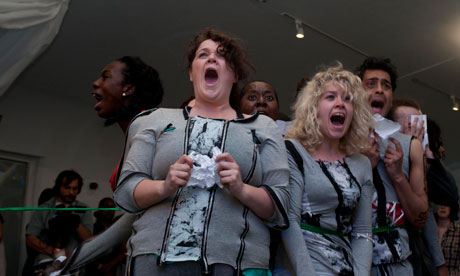After a visit from two artists, jailed or forced into hiding because of their art, the teens of Tripwires created a thought-provoking performance

Not to be silenced ... youth project Tripwires performs at the Mile End Park Arts Pavilion. Photo: Pablo Conejo Pascual
In oppressive societies artists don't just need skill and creativity – they have to be courageous and tenacious to a degree that many of us find unimaginable. An example of such an artist is Burmese painter and performance artist, Htein Lin, who developed a whole covert palette of painting techniques to keep working during his 6 ½ years as a political prisoner. He made use of the extremely limited materials he had to hand – soap, cigarette lighters, tin plates and the paint he was able to smuggle in to his cell – to make mono-prints on prison-issue sarongs, beautiful yet painful images of prison life. Then he had to hide his precious work in case it was seized.
A similar tenacity propelled Gurpreet Kaur Bhatti to write her play Behzti, which angered many in the Birmingham Sikh community when it appeared at Birmingham Rep in 2004, and was later cancelled. Undeterred, despite the fact that she was forced into hiding, she has walked back into the fire with her most recent play, Behud, an imaginative response to the events surrounding the cancellation of Behzti. Gurpreet believes that if you don't give your whole truth, you are cheating the audience.
Both Htein Lin and Gurpreet recently shared these perspectives with a group of young leadership trainees putting together a performance for a pilot project called Tripwires, organised by Index on Censorship and Phakama UK, the youth arts organisation in residence at Queen Mary, University of London. The aim of Tripwires is to investigate how the arts can open up debates around freedom of expression and censorship. The group read from Gurpreet's play in the afternoon, and followed it with an important discussion about sexuality, gender and faith.
Like many of the discussions Tripwire have hosted, it was spontaneous and full of epiphanies. But in the light of Gurpreet's and Htein Lin's pasts, the power of imagination and creativity to communicate experience came even more sharply into relief. Like the founders of Belarus Free Theatre – who came to talk to the group about their work only two weeks before the elections in Belarus took place that led to them being forced to flee the country – the passion and conviction of all these artists contributed massively to the making of a new piece of theatre as part of the programme.
Following a period of investigation which featured workshops on different performance styles and art forms, the group spent two weeks putting together a show that took place for two nights at the Mile End Park Arts Pavilion. They transformed the gallery space on the Regents Canal in Tower Hamlets, east London, into a multi-stage debating hall, testing the limits of freedom and the nature of censorship. But rather than being a conventional hustings, it was an interactive, site-specific performance featuring theatre, dance, poetry and installation.
When an audience identifies with a performance, the applause at the end of the show has a particular intensity – it becomes a "thank you" for shaping their innermost thoughts or reflecting their experiences. But the applause after Tripwire's shows went beyond that: it was both the sound of appreciation and the important recognition of thoughts silenced by others.
read more: Guardian
A similar tenacity propelled Gurpreet Kaur Bhatti to write her play Behzti, which angered many in the Birmingham Sikh community when it appeared at Birmingham Rep in 2004, and was later cancelled. Undeterred, despite the fact that she was forced into hiding, she has walked back into the fire with her most recent play, Behud, an imaginative response to the events surrounding the cancellation of Behzti. Gurpreet believes that if you don't give your whole truth, you are cheating the audience.
Both Htein Lin and Gurpreet recently shared these perspectives with a group of young leadership trainees putting together a performance for a pilot project called Tripwires, organised by Index on Censorship and Phakama UK, the youth arts organisation in residence at Queen Mary, University of London. The aim of Tripwires is to investigate how the arts can open up debates around freedom of expression and censorship. The group read from Gurpreet's play in the afternoon, and followed it with an important discussion about sexuality, gender and faith.
Like many of the discussions Tripwire have hosted, it was spontaneous and full of epiphanies. But in the light of Gurpreet's and Htein Lin's pasts, the power of imagination and creativity to communicate experience came even more sharply into relief. Like the founders of Belarus Free Theatre – who came to talk to the group about their work only two weeks before the elections in Belarus took place that led to them being forced to flee the country – the passion and conviction of all these artists contributed massively to the making of a new piece of theatre as part of the programme.
Following a period of investigation which featured workshops on different performance styles and art forms, the group spent two weeks putting together a show that took place for two nights at the Mile End Park Arts Pavilion. They transformed the gallery space on the Regents Canal in Tower Hamlets, east London, into a multi-stage debating hall, testing the limits of freedom and the nature of censorship. But rather than being a conventional hustings, it was an interactive, site-specific performance featuring theatre, dance, poetry and installation.
When an audience identifies with a performance, the applause at the end of the show has a particular intensity – it becomes a "thank you" for shaping their innermost thoughts or reflecting their experiences. But the applause after Tripwire's shows went beyond that: it was both the sound of appreciation and the important recognition of thoughts silenced by others.
read more: Guardian
